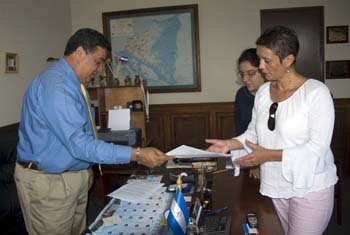
FEMINIST INTERNATIONAL Radio
ENDEAVOUR
FIRE
JUNE,
2008
San José. June 16, 2008. FIRE.
Nicaragua: Hunger strike suspended, but the struggle continues
Today three representatives of several women’s organizations in Costa Rica went to the Nicaraguan Embassy where they presented a letter in solidarity with Dora María Téllez, of the Movimiento Renovación Sandinista (Renovated Sandinista Movement – or MRS) and the struggle that they have undertaken for democratization and justice in Nicaragua.

The letter, signed by 27 women’s
organizations was given to Ambassador Harold Rivas Reyes by the activists
Carmen Muñoz and Marcia Ugarte stated, “We want to make you aware of our
concern about the health and security of Dora María Téllez, known
internationally for her commitment against the Somoza dictatorship, who
since the 4th of June, 2008 undertook a hunger strike to protest
the recent cancellation of the legal status of the MRS Party.” The letter
continues,” This situation adds to the list of various examples of
restrictions on democratic liberties and harassment of human rights
promoters in what looks like a deliberate policy to limit the actions of
those who challenge and denounce grave violations of human rights on the
part of the present governing party and its government.”
According to the letter, “At the
end of 2007, it was public knowledge, the case of political persecution
initiated by the Nicaraguan government against nine leaders of the feminist
movement who have worked for years in the defense of the rights of women.
The Nicaraguan state cannot criminalize the actions of those who have spoken
in defense of the rights of the majority of the population that are being
rendered vulnerable. “
Dora María Téllez, known
internationally as a human rights activist against the Somoza dictatorship,
as well as Minister of Health in the 1979 Revolution, and today as founder
and leader of the MRS Party, was on hunger strike from June 4-16 to protest
the threat of cancellation of their legal status which actually took place
on June 11th in a letter that the Supreme Electoral Council sent
to the MRS Party.
The representatives of the Costa
Rica women’s movement who met with the Nicraguan Ambassador today challenged
him in asking if there is a good reason to disqualify the MRS Party. María
Suárez Toro told Rivas that she had observed the recent Nicaraguan elections
as part of a large regional delegation of the Observatorio de
Transgresion Feminista (Feminist Transformation Watch) that came to
Nicaragua. Suárez said, “I am witness to the fact that the MRS Party
participated legally and legitimately in fulfilling all of the requisites
for the election. I cannot understand how now without any electoral
process, this party could have lost its legal status.”
Nicaraguan Government Argument to Disqualify the MRS
Ambassador Rivas acknowledged that the only argument against the MRS in the recent document presented by the Supreme Electoral Council was that “this party has not sent the list of its leadership, although it was requested twice.”
Suárez insisted, “Is this really a
good reason to remove their legal status?” To which the Nicaraguan
government representative affirmed his conviction of the importance of
maintaining an open dialogue and defending the institutionality and
democracy in his country. He made a commitment to send the letter given to
him by the Costa Rican activists to the Nicaraguan Government. “My work as
Ambassador is for a country, not for a party in government,” he affirmed.
According to the demonstrations in
Nicaragua and the weak arguments of the Electoral Council in their official
declaration this week, the action to eliminate the legality of the MRS
Party, a political party which is ready to participate in upcoming municipal
elections in the country, is unfair because the only prerequisite that they
have not fulfilled is presenting the names of their leaders. The Center for
Human Rights in Nicaragua has declared that this action of the Electoral
Council, represents “the devaluation of democratic institutionality, the
ambition of power and selfish interests that have overridden ethical, moral
and human rights principals, and the respect for our constitution.”
In addition to Costa Rica, similar
actions in the embassies of Nicaragua took place in Mexico, Honduras, Peru
and Uruguay by women’s organizations convened by the Feminist Transformation
Watch (Observatorio deTransgresión Feminista), to emphasize that what
is happening in Nicaragua with the disrespect of Dora María and the
struggles that she is leading are part of what is happening overall in that
country. “Our country is facing grave violations of human rights that
render the integrity of millions of women vulnerable.”
International Declarations of Solidarity
The calls for solidarity by feminists and women’s and feminist organizations in the region have generated expressions of solidarity and denouncements at the international level. Among them, is legendary writer Margaret Randall, author of the first book written about Sandinista women, The Daughters of Sandino in 1983. In her letter addressed to the government of Nicaragua Randall stated, “The eyes of the world are on Nicaragua today as they were in 1979 and throughout the 1980s when the FSLN (Frente Sandinista Liberación Nacional or Sandinista National Liberation Front) was remaking a country ravaged by dictatorship and then torn by war. But today the eyes of the world are on Nicaragua because one of the most brilliant, honest and courageous of those early revolutionaries, Dora María Téllez has launched a hunger strike to call attention to the ways in which a criminal political pact is robbing Nicaraguans of the dreams so which so many died. Please do not add Dora María’s death to the long list of martyred Nicaraguans. Her current act of valor, a desperate last ditch attempt to return transparency and well being to her country’s people must not go unheeded. If Nicaragua wants to be considered a democracy, it must protect the rights of all political parties."
The feminists
caught the attention of six women Nobel Prize Laureates in the Women’s Nobel
Initiative, who issued a
declaration in support of Dora María. Jody Williams, Shirin Ebadi,
Wangari Maathai, Rigoberta Menchú Tum, Betty Williams and Mairead Corrigan
Maguire declared, “As women and as Nobel Peace Laureates, we are deeply
concerned about news from Nicaragua that Dora Maria Tellez, former Minister
of Health and legendary Sandinista commander, has launched a hunger strike
to protest and halt steps by President Daniel Ortega to rescind
the legal status of the political party she co-founded, the MRS
Party (Movimiento Renovación Sandinista). We salute her courage and
commitment to protect basic political freedoms and support the call to
action mobilized by women and civil society across the region.”
The women
Nobel Laureates’ declaration continued, “We concur with the words of
internationally acclaimed Nicaraguan poet, Giaconda Belli, who states that
“She [Dora Maria] has emerged in the midst of the multitude….to demonstrate
that liberty is a non-negotiable and in the face of
injustice, silence and passivity do not have a place…”
“We call on
the international community to ensure that the Nicaraguan government does
not criminalize the actions of those who have raised their voices to advance
and defend the rights of Nicaraguan citizens and their ongoing struggle for
democracy and justice. We ask concerned citizens to join hands with the
many Nicaraguan human rights, feminist and peace activists to
express solidarity with Dora Maria Tellez and her important
actions by contacting Nicaraguan Embassies around the world demanding that
the government of President Ortega respect the human rights and democratic
principles he swore to uphold when he became President.”
Other international figures who responded to the call by civil society in Nicaragua include the US academic and activist Noam Chomsky, who is the most cited in the history for his analysis about the “evils of capitalism;” the Uruguayan poet Mario Benedetti; and another Uruguayan Eduardo Galeano, who is author of The Open Veins of Latin America, and The Memories of the Fire, which highlight the damage caused by colonization, imperialism, and capitalist exploitation.
Also sending a message of
solidarity is the Argentinian poet Juan Gelman, an activist against the
Argentinian dictatorship and who lived in Nicaragua during the Sandinista
Revolution and worked in the news agencies near Nicaragua; the US
photographer Susan Meiselas, who because of her photography in the struggle
against the Samoza dictatorship received the prize Rubén Darío by the first
Sandinista government in the 1980s; and the British poet Salmon Rushdie who
in the 1980 visited Nicaragua and wrote a book about the Sandinista
Revolution entitled, The Smile of the Jaguar. Also joining the
solidarity group is Bianca Jagger, a Nicaraguan activist and human rights
defender who in the 80s assumed a critical role about US policy toward
Nicaragua and wrote in numerous newspapers and magazines using her fame and
prestige to let people know about the situation in her country of origin.
These international figures say in
their letter addressed to the Nicaraguan government that “we admire the
courage and commitment of Dora María Téllez, her integrity, prestige,
dedication and risk by being on hunger strike during 13 days, which
motivates us to make a statement to demand of the Nicaraguan government to
think hard about the consequences of not responding to the demands she
presents. What made Dora Maria risk her health and her life once again with
this hunger strike, is a clear demand: “that the political spaces do not
close; and that there be a national dialogue to solve the food crisis and
the high cost of living that as in many countries, Nicaragua faces.”
The letter continues, “None of these demands are irrational, and a government that wants popular support should respond to them. We want to add our voices to this demand and this proposal. Political representation is a right. Protest is a right against the mechanisms that closed those spaces. Dora María is exercising those rights. She represents a broad sector of Nicaraguan society that should be heard.” (Source: Radio La Primerisima)
# # #
For more information about FIRE go to www.radiofeminista.net
